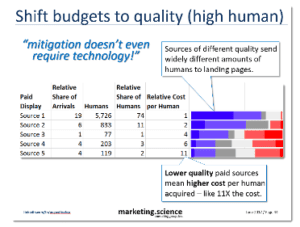Do you know the per cent of bots versus humans arriving on your website from different sources – organic, paid, display, social, and mobile? Do you know how to safeguard your site against “bot” (“non-human”) traffic? Most marketers cannot answer these questions, even though the topic of ad fraud is very much top-of-mind.
In addition, much misinformation and many misconceptions add to the confusion around ad fraud. For example, most of us assume data-driven marketing is immune to ad fraud. It is not. We already focus on real business outcomes as a best practice. But more marketers should understand how the fraudulent activity of bots can also negatively impact other parts of their business. For example, the fake traffic, impressions, and clicks generated by bots are recorded in analytics. Optimizations based on these inaccurate performance metrics may result in more money going to the bad guys and drive your business results away from, not toward, profitability.
The Response Marketing Association and its members are committed to high-quality, performance-driven marketing, and as such, to measuring and combatting ad fraud. The RMA is pleased to announce an original research study on digital ad fraud, led by noted ad fraud researcher, Dr Augustine Fou.
The study is for RMA members only and is free (as is RMA Membership – sign up here ). It will run during the months of April, May and June 2021. To participate members must notify us of their intent to participate by March 31, 2021, and install a 2-line embed code on their own websites or landing pages designed to capture response from your digital advertising campaigns. Fully anonymous data will be collected about the browsers that arrive on the site and will be used to differentiate real humans from bot traffic. Sample charts can be seen in Dr Fou’s published studies, here. https://www.slideshare.net/augustinefou/presentations.
 At the end of the study, each participant will receive a customized, written report (e.g. 10 – 15 page Powerpoint) based on their own directly measured data. The report will include specific recommendations for reducing bots, improving outcomes, or shifting paid media budgets to higher quality sources (see chart to the right).
At the end of the study, each participant will receive a customized, written report (e.g. 10 – 15 page Powerpoint) based on their own directly measured data. The report will include specific recommendations for reducing bots, improving outcomes, or shifting paid media budgets to higher quality sources (see chart to the right).
The Response Marketing Association will also release a short white paper, with insights derived from the aggregated data. This can also serve as a benchmark against which members can further optimize their own fraud-fighting capabilities and efforts.
For more information on how to participate, please contact derekl@responsema.org
Watch our President, Lorne Solway’s interview with Dr Augustine Fou


